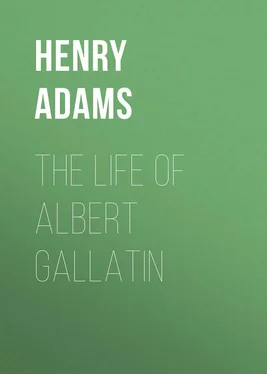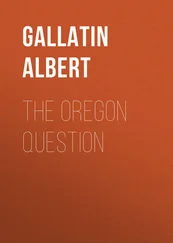Henry Adams - The Life of Albert Gallatin
Здесь есть возможность читать онлайн «Henry Adams - The Life of Albert Gallatin» — ознакомительный отрывок электронной книги совершенно бесплатно, а после прочтения отрывка купить полную версию. В некоторых случаях можно слушать аудио, скачать через торрент в формате fb2 и присутствует краткое содержание. Жанр: foreign_antique, foreign_prose, на английском языке. Описание произведения, (предисловие) а так же отзывы посетителей доступны на портале библиотеки ЛибКат.
- Название:The Life of Albert Gallatin
- Автор:
- Жанр:
- Год:неизвестен
- ISBN:нет данных
- Рейтинг книги:4 / 5. Голосов: 1
-
Избранное:Добавить в избранное
- Отзывы:
-
Ваша оценка:
- 80
- 1
- 2
- 3
- 4
- 5
The Life of Albert Gallatin: краткое содержание, описание и аннотация
Предлагаем к чтению аннотацию, описание, краткое содержание или предисловие (зависит от того, что написал сам автор книги «The Life of Albert Gallatin»). Если вы не нашли необходимую информацию о книге — напишите в комментариях, мы постараемся отыскать её.
The Life of Albert Gallatin — читать онлайн ознакомительный отрывок
Ниже представлен текст книги, разбитый по страницам. Система сохранения места последней прочитанной страницы, позволяет с удобством читать онлайн бесплатно книгу «The Life of Albert Gallatin», без необходимости каждый раз заново искать на чём Вы остановились. Поставьте закладку, и сможете в любой момент перейти на страницу, на которой закончили чтение.
Интервал:
Закладка:
The delays of the court of chancery have been immense, and those delays are inseparable from the court if the practice of England be observed. But that practice is not necessary. ‘Tis greatly abridged in Virginia by an Act passed in 1787, and great advantages result from the reform. There have been instances of suits depending for twenty years, but under our present regulations a decision would be had in that court as soon as any other in which there were an equal number of weighty causes. The parties may almost immediately set about collecting their proofs, and so soon as they have collected them they may set the cause on the court docket for a hearing.
It has never been proposed to blend the principles of common law and chancery so as for each to operate at the same time in the same cause; and I own it would seem to me to be very difficult to effect such a scheme, but at the same time it must be admitted that could it be effected it would save considerable sums of money to the litigant parties.
I enclose you a copy of the act you request. I most sincerely condole with you on your heavy loss. Time only, aided by the efforts of philosophy, can restore you to yourself.
I am, dear sir, with much esteem, your obedient servant,
J. Marshall.In a letter written in 1838, when the constitution was revised, Mr. Gallatin gave an account of the convention of 1789, which was, he said, “the first public body to which I was elected, and I took but a subordinate share in its debates. It was one of the ablest bodies of which I was a member and with which I was acquainted. Indeed, could I except two names, Madison and Marshall, I would say that it embraced as much talent and knowledge as any Congress from 1795 to 1812, beyond which my personal knowledge does not extend. But the distinguishing feature of the convention was that, owing perhaps to more favorable times, it was less affected by party feelings than any other public body that I have known. The points of difference were almost exclusively on general and abstract propositions; there was less prejudice and more sincerity in the discussions than usual, and throughout a desire to conciliate opposite opinions by mutual concessions. The consequence was that, though not formally submitted to the ratification of the people, no public act was ever more universally approved than the constitution of Pennsylvania at the time when it was promulgated.” 9 9 Writings, ii. 523.
The next year, in October, 1790, Mr. Gallatin was elected to the State Legislature, to which he was re-elected in 1791 and 1792. In 1790 there was a contest, and he had a majority of about two-thirds of the votes. Afterwards he was returned without opposition.
The details of State politics are not a subject of great interest to the general public, even in their freshest condition, and the local politics of Pennsylvania in 1790 are no exception to this law. They are here of importance only so far as they are a part of Mr. Gallatin’s life, and the medium through which he rose to notice. He has left a memorandum, which is complete in itself, in regard to his three years’ service in the State Legislature:
“I acquired an extraordinary influence in that body (the Pennsylvania House of Representatives), – the more remarkable, as I was always in a party minority. I was indebted for it to my great industry and to the facility with which I could understand and carry on the current business. The laboring oar was left almost exclusively to me. In the session of 1791-1792 I was put on thirty-five committees, prepared all their reports, and drew all their bills. Absorbed by those details, my attention was turned exclusively to administrative laws, and not to legislation properly so called. The great reforms of the penal code, which, to the lasting honor of Pennsylvania, originated in that State, had already been carried into effect, principally under the auspices of William Bradford. Not being a professional lawyer, I was conscious of my incapacity for digesting any practicable and useful improvement in our civil jurisprudence. I proposed that the subject should be referred to a commission, and Judge Wilson was accordingly appointed for that purpose. He did nothing, and the plan died away. It would have been better to appoint the chief justice and the attorney-general of the State (McKean and Bradford), and, in the first instance at least, to have confined them to a revision of the statute law, whether colonial, State, or British, still in force.
1790-1793“I failed, though the bill I had introduced passed the House, in my efforts to lay the foundation for a better system of education. Primary education was almost universal in Pennsylvania, but very bad, and the bulk of schoolmasters incompetent, miserably paid, and held in no consideration. It appeared to me that in order to create a sufficient number of competent teachers, and to raise the standard of general education, intermediate academical education was an indispensable preliminary step; and the object of the bill was to establish in each county an academy, allowing to each out of the treasury a sum equal to that raised by taxation in the county for its support. But there was at that time in Pennsylvania a Quaker and a German opposition to every plan of general education.
“The spirit of internal improvements had not yet been awakened. Still, the first turnpike-road in the United States was that from Philadelphia to Lancaster, which met with considerable opposition. This, as well as every temporary improvement in our communications (roads and rivers) and preliminary surveys, met, of course, with my warm support. But it was in the fiscal department that I was particularly employed, and the circumstances of the times favored the restoration of the finances of the State.
“The report of the Committee of Ways and Means of the session 1790-1791 (presented by Gurney, chairman) was entirely prepared by me, known to be so, and laid the foundation of my reputation. I was quite astonished at the general encomiums bestowed upon it, and was not at all aware that I had done so well. It was perspicuous and comprehensive; but I am confident that its true merit, and that which gained me the general confidence, was its being founded in strict justice, without the slightest regard to party feelings or popular prejudices. The principles assumed, and which were carried into effect, were the immediate reimbursement and extinction of the State paper money, the immediate payment in specie of all the current expenses or warrants on the treasury (the postponement and uncertainty of which had given rise to shameful and corrupt speculations), and provision for discharging without defalcation every debt and engagement previously recognized by the State. In conformity with this the State paid to its creditors the difference between the nominal amount of the State debt assumed by the United States and the rate at which it was funded by the Act of Congress.
1790-1793“The proceeds of the public lands, together with the arrears, were the fund which not only discharged all the public debts but left a large surplus. The apprehension that this would be squandered by the Legislature was the principal inducement for chartering the Bank of Pennsylvania with a capital of two millions of dollars, of which the State subscribed one-half. This and similar subsequent investments enabled Pennsylvania to defray out of the dividends all the expenses of government without any direct tax during the forty ensuing years, and till the adoption of the system of internal improvement, which required new resources.
“It was my constant assiduity to business and the assistance derived from it by many members which enabled the Republican party in the Legislature, then a minority on a joint ballot, to elect me, and no other but me of that party, Senator of the United States.”
Читать дальшеИнтервал:
Закладка:
Похожие книги на «The Life of Albert Gallatin»
Представляем Вашему вниманию похожие книги на «The Life of Albert Gallatin» списком для выбора. Мы отобрали схожую по названию и смыслу литературу в надежде предоставить читателям больше вариантов отыскать новые, интересные, ещё непрочитанные произведения.
Обсуждение, отзывы о книге «The Life of Albert Gallatin» и просто собственные мнения читателей. Оставьте ваши комментарии, напишите, что Вы думаете о произведении, его смысле или главных героях. Укажите что конкретно понравилось, а что нет, и почему Вы так считаете.












